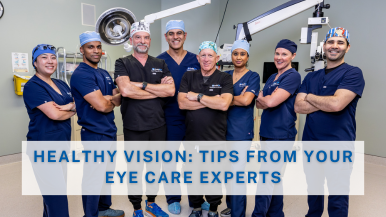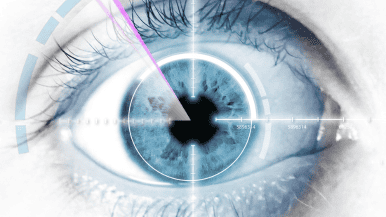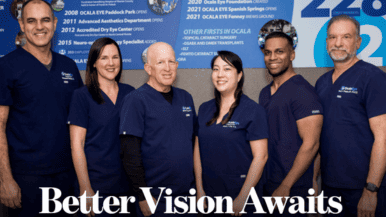 What are eye vitamins?
What are eye vitamins?- Can eye vitamins improve vision?
- Can vitamins help age-related macular degeneration?
- Can vitamins help cataracts?
- How can you protect your vision?
Eye health is something many of us take for granted until something goes wrong. By the year 2050, the CDC anticipates more than four million Americans will suffer from an uncorrectable impairment of their vision, in large part from increasing rates of diabetes and other chronic illnesses.
Obviously, your eye health is connected to your overall physical health. Many people take a daily vitamin supplement to improve their health. Is there a vitamin you should take for your eyes?
What Are Eye Vitamins?
Nutrition plays a key role in the health of your body, including your eyes. Eye vitamins are supplements typically in the form of pills that add nutrients to the body to replenish what you may be missing.
Vitamin deficiencies can cause eye problems, so if you’re suffering from macular degeneration, glaucoma, cataracts, or other vision issues, you may think that there’s a vitamin that can help. That may be true, depending upon your condition. Nutrition certainly plays a part in your overall health and vitamin deficiencies can cause eye issues to occur. If you’re missing key nutrients your doctor may recommend vitamin supplements as a way to shore up your body’s health.
What Vitamins Can Help My Eyes?
Some of the most important vitamins for your eye health come from eating good healthy foods. Some of the best vitamins for your eyes include:
- Niacin, or vitamin B3, helps your body convert food to energy and may prevent glaucoma according to some studies
- Lutein and zeaxanthin are vitamins formed from plant compounds, and the research shows they may protect your eyes from several damaging diseases
- Omega-3 fatty acids are found in the cells of your retina, and this vitamin may help prevent diabetic retinopathy
- Riboflavin, or vitamin B2 may help prevent cataracts, although more research needs to occur
- Thiamine, or vitamin B1, may reduce cataracts
- Vitamin A helps improve your night vision
- Vitamin B6, B9, and B12 can help reduce inflammation in the body’s tissues
- Vitamin C can help you produce more collagen, which is a protein that helps build the cornea of the eye
- Vitamin E is an antioxidant that protects your cells, and some studies show it can also help prevent age-related cataracts
If you’re missing any of these vitamins in your diet, supplements may be beneficial to your overall health and your eyes. However, if you’re eating a healthy, balanced diet, you may be getting all of the nutrients your body needs to help prevent serious illnesses.
That’s why it’s always best to consult with a doctor before taking vitamin supplements. This is particularly true if you are taking other medications.
Can Eye Vitamins Improve Vision?
The answer to this question is complicated. There are plenty of vitamin companies out there that would like to sell you their products. The vitamin industry is a $37 billion field that is relatively unregulated. Problems can arise when taking too many or when combining different types of supplements or other medications in the body. Recent research even shows that most vitamins do not improve our health.
In the case of your eyes, there is one exception to these findings. The Age-Related Eye Disease Studies (AREDS and AREDS2) were conducted by the National Eye Institute. The studies focused on two key eye diseases that affect millions of older Americans: age-related macular degeneration and cataracts.
Can Vitamins Help Age-Related Macular Degeneration (AMD)?
AMD is a serious eye illness that is the top cause of vision loss in people over age 50. There are two forms of AMD: dry AMD is a gradual vision destroyer, while wet AMD causes rapid vision loss.
Vitamins can help patients suffering from AMD. The National Eye Institute recommends daily consumption of:
- Copper 2 mg
- Lutein 10 mg
- Vitamin C 500 mg
- Vitamin E 400 IU
- Zeaxanthin 2 mg
- Zinc 80 mg
The AREDS and AREDS2 studies found that serious vision loss caused by AMD was reduced by 25% over six years.
The studies show that these nutritional supplements may help patients with early AMD or those who are in an intermediate phase of the disease. Talk with your ophthalmologist about whether you are at risk for the disease. Studies show if you are at risk, these vitamins may help.
Can Vitamins Help Cataracts?
More than 24 million Americans each year develop cataracts in their later years. The AREDS and AREDS2 studies recommend the same daily supplements in the same dosages as they do for AMD patients to help prevent this eye disease
With this said, there are also conflicting studies that show there are no benefits to vitamin supplements when it comes to developing cataracts. One 2019 study stated, “People who had taken these products—in some cases for many years—developed cataracts just as often as people who had been taking a placebo.”
So, how can you protect your eyes if vitamins may not work as well as you had hoped?
How Can You Protect Your Vision?
The best way to protect your vision is to eat as healthy as you can. Eating a wide variety of fruits and vegetables at all stages in your life will help you get the vitamins you need to promote overall health and the health of your eyes.
You should also be diligent about protecting your eyes from harmful sun rays. In the same way you would protect your skin with sunscreen, you should always wear sunglasses to protect your eyes from excessive UV rays. UV exposure can harm the front and back of the delicate eye structure and contribute to illnesses that cause vision loss. Invest in a good-quality wrap-around set of sunglasses with 100% UV spectrum protection.
Limit your screen time. Too much computing or time on other screens all day can cause eye strain. Try the 20/20/20 rule, which is to take a 20-second break every 20 minutes to focus your eyes 20 feet away. This refocuses your eyes but also forces you to blink, which is something we forget to do when we stare at blue screens all day.
Finally, protect your vision by visiting Ocala Eye as part of your annual preventive healthcare checkup. A comprehensive eye exam will allow us to look for early signs of eye illness that might not yet even cause you any symptoms. Just because your eyes don’t bother you now, doesn’t mean you shouldn’t care for them like you do the rest of your body. Come and see us to protect your eyesight for a lifetime.




